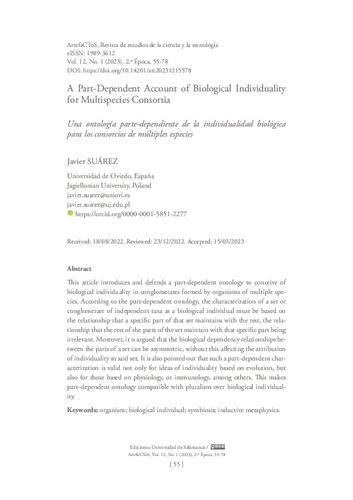A Part-Dependent Account of Biological Individuality for Multispecies Consortia
Otros títulos:
Una ontología parte-dependiente de la individualidad biológica para los consorcios de múltiples especies
Autor(es) y otros:
Fecha de publicación:
Versión del editor:
Citación:
Descripción física:
Resumen:
This article introduces and defends a part-dependent ontology to conceive of biological individuality in conglomerates formed by organisms of multiple species. According to the part-dependent ontology, the characterization of a set or conglomerate of independent taxa as a biological individual must be based on the relationship that a specific part of that set maintains with the rest, the relationship that the rest of the parts of the set maintain with that specific part being irrelevant. Moreover, it is argued that the biological dependency relationships between the parts of a set can be asymmetric, without this affecting the attribution of individuality to said set. It is also pointed out that such a part-dependent characterization is valid not only for ideas of individuality based on evolution, but also for those based on physiology, or immunology, among others. This makes part-dependent ontology compatible with pluralism over biological individuality.
This article introduces and defends a part-dependent ontology to conceive of biological individuality in conglomerates formed by organisms of multiple species. According to the part-dependent ontology, the characterization of a set or conglomerate of independent taxa as a biological individual must be based on the relationship that a specific part of that set maintains with the rest, the relationship that the rest of the parts of the set maintain with that specific part being irrelevant. Moreover, it is argued that the biological dependency relationships between the parts of a set can be asymmetric, without this affecting the attribution of individuality to said set. It is also pointed out that such a part-dependent characterization is valid not only for ideas of individuality based on evolution, but also for those based on physiology, or immunology, among others. This makes part-dependent ontology compatible with pluralism over biological individuality.
Ficheros en el ítem





